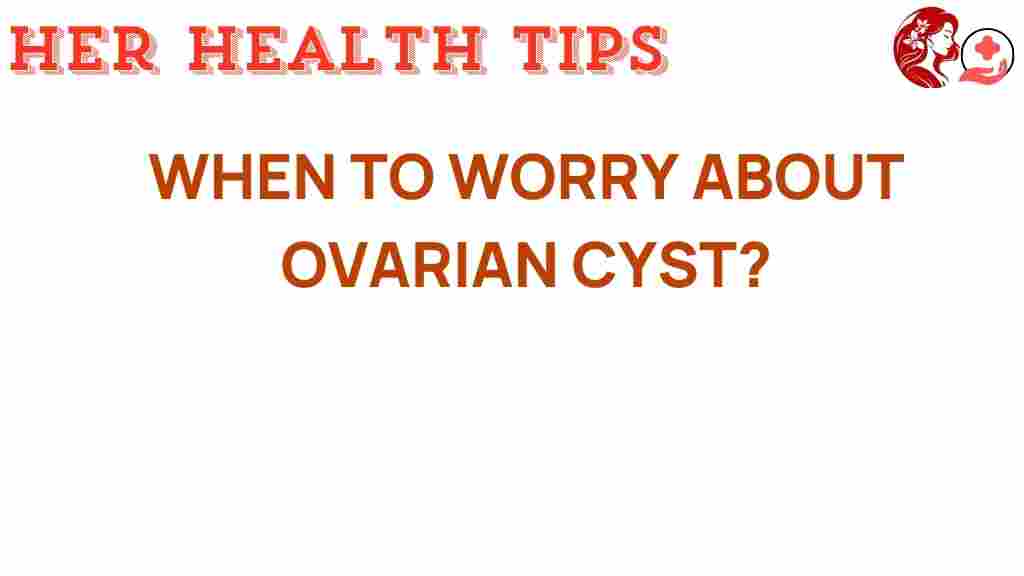Ovarian Cysts: When Should You Be Concerned?
Ovarian cysts are fluid-filled sacs that can develop on the ovaries, and they are a common occurrence in women of reproductive age. While most ovarian cysts are benign and resolve on their own, some can lead to health concerns that require medical attention. Understanding ovarian cysts is essential for women’s health, as it helps in recognizing symptoms, getting timely diagnosis, and receiving appropriate treatment. In this article, we will explore the various facets of ovarian cysts, including their symptoms, diagnosis, treatment options, and when to seek medical advice.
What Are Ovarian Cysts?
Ovarian cysts are typically classified into two main types: functional cysts and pathological cysts. Functional cysts are a normal part of the menstrual cycle, while pathological cysts may be due to underlying health concerns.
- Functional Cysts: These are the most common type and include follicular cysts and corpus luteum cysts. They usually resolve without treatment.
- Pathological Cysts: These may include dermoid cysts, cystadenomas, and endometriomas, which may require further evaluation and treatment.
Common Symptoms of Ovarian Cysts
Many women with ovarian cysts experience no symptoms, but when symptoms do occur, they can vary in intensity. Common symptoms include:
- Pelvic pain or discomfort
- Abdominal bloating or pressure
- Changes in menstrual cycle, including irregular periods
- Pain during intercourse
- Difficulty emptying the bladder completely
- Weight gain
It is essential to pay attention to these symptoms, as they can indicate the presence of ovarian cysts or other reproductive health issues. If you experience sudden severe abdominal pain, fever, or vomiting, you should seek medical attention immediately, as these could be signs of a ruptured cyst or other serious conditions.
Diagnosis of Ovarian Cysts
If you suspect you have ovarian cysts or are experiencing symptoms, it is crucial to consult a healthcare provider for an accurate diagnosis. The diagnostic process may involve:
- Pelvic Exam: A physical examination to assess for any abnormalities.
- Ultrasound: An imaging test that uses sound waves to create images of the ovaries and detect cysts.
- Blood Tests: To check hormone levels and rule out conditions like ovarian cancer.
Based on the findings, your healthcare provider will determine the best course of action and whether further tests are necessary.
Health Concerns Related to Ovarian Cysts
While most ovarian cysts are harmless, there are certain health concerns associated with them that you should be aware of:
- Rupture: A cyst may rupture, leading to severe pain and internal bleeding.
- Torsion: An ovarian cyst can cause the ovary to twist, leading to pain and potentially loss of the ovary.
- Malignancy: In rare cases, an ovarian cyst may be cancerous, so monitoring and assessment are vital.
Regular check-ups and consultations with a healthcare provider can help in managing these health concerns effectively.
Treatment Options for Ovarian Cysts
The treatment for ovarian cysts depends on several factors, including the type of cyst, its size, and whether it is causing symptoms. Here are some common treatment options:
- Watchful Waiting: If the cyst is small and asymptomatic, your doctor may recommend monitoring it over time.
- Medications: Hormonal contraceptives may be prescribed to help regulate the menstrual cycle and prevent future cysts.
- Surgery: If the cyst is large, persistent, or causing significant symptoms, surgical intervention may be necessary. This could involve cystectomy (removal of the cyst) or oophorectomy (removal of the ovary).
Always consult with your healthcare provider for personalized medical advice tailored to your specific situation.
When to Seek Medical Advice
While many ovarian cysts are benign, knowing when to seek medical advice is crucial for your reproductive health. You should contact your healthcare provider if you experience:
- Severe, sudden abdominal pain
- Persistent pain that doesn’t improve
- Fever, vomiting, or other signs of infection
- Changes in your menstrual cycle that are unusual for you
Proactive communication with your healthcare provider is vital in managing your health concerns effectively.
Step-by-Step Process for Managing Ovarian Cysts
Managing ovarian cysts involves a systematic approach to ensure women’s health is maintained. Here’s a step-by-step process:
- Recognize Symptoms: Be aware of any changes in your body, particularly related to pelvic pain or menstrual irregularities.
- Consult a Healthcare Provider: Schedule an appointment to discuss your symptoms and undergo a pelvic exam.
- Follow Diagnostic Procedures: Participate in recommended tests such as ultrasounds and blood tests for accurate diagnosis.
- Discuss Treatment Options: Based on your diagnosis, work with your healthcare provider to determine the best treatment plan.
- Regular Follow-ups: Attend follow-up appointments to monitor the cyst and adjust treatment as necessary.
Troubleshooting Tips for Managing Ovarian Cysts
If you are dealing with ovarian cysts, here are some troubleshooting tips to help manage your condition:
- Track Your Symptoms: Keep a journal of your symptoms and menstrual cycle to share with your healthcare provider.
- Stay Informed: Educate yourself about ovarian cysts and potential complications.
- Maintain a Healthy Lifestyle: A balanced diet, regular exercise, and stress management can support overall reproductive health.
- Communicate Openly: Don’t hesitate to ask your healthcare provider questions and express any concerns.
For more detailed information on managing reproductive health, consider visiting reputable sources like the Office on Women’s Health.
Conclusion
Understanding ovarian cysts is crucial for women’s health, as awareness of symptoms, diagnosis, and treatment options can significantly affect outcomes. While most ovarian cysts are benign and resolve without intervention, being proactive about your reproductive health is essential. If you experience any concerning symptoms, don’t hesitate to seek medical advice. Remember, your health is your most valuable asset, and staying informed is key to maintaining it.
For further reading on women’s reproductive health, you may also explore this resource for comprehensive insights and medical advice.
This article is in the category Reproductive and created by HerHealthTips Team
